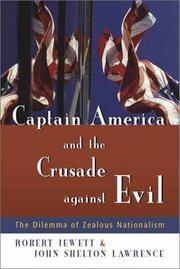
Captain America and the crusade against evil
By John Shelton Lawrence, Robert Jewett
Subjects: War on terrorism, 2001-2009, Sociology, Bekämpfung, Politics and government, Messianism, Political, Intellectual life, Political messianism, united states, Islam, Anthropology - Cultural, Foreign relations, War on Terrorism (2001-2009) fast (OCoLC)fst01754980, Public Policy - Cultural Policy, Großmachtpolitik, Civil religion, Heroes in mass media, Jihad, Sociology of Religion, Diplomatic relations, Political culture, 20th century, Relations, USA, Christianity and other religions, Causes, Nationalismus, Außenpolitik, Civilization, Millennialism, Social Science, Popular culture, Heroes, 2001-, American National characteristics, Interfaith relations, United states, politics and government, 2001-2009, United States, Christianity and other religions, islam, Religion & Beliefs, War on Terrorism, 2001-, Islam, relations, christianity, POLITICS & GOVERNMENT, United states, foreign relations, 20th century, Christianity, Political messianism, Archaeology / Anthropology, Folklore & Mythology, Folklore, Terrorismus, War on Terrorism, 2001-2009, Political Messianism, United states, foreign relations, 2001-2009, Political aspects
Description: "Arguing that the superhero is the antidemocratic counterpart of the classical "monomyth" described by Joseph Campbell, the authors show that the American version of the monomyth derives from tales of redemption. In settings where institutions and elected leaders always fail, the American monomyth offers heroes who combine elements of the selfless servant with the lone, zealous crusader who destroys evil. Taking the law into their own hands, these unelected figures assume total power to rid the community of its enemies, thus comprising a distinctively American form of pop fascism.". "Drawing widely from books, films, TV programs, video games, and places of superhero worship on the World Wide Web, the authors trace the development of the American superhero during the twentieth century and expose the mythic patterns behind the most successful elements of pop culture. Lawrence and Jewett challenge readers to reconsider the relationship of this myth to traditional religious and social values, and they show how, ultimately, these antidemocratic narratives gain the spiritual loyalties of their audiences, in the process inviting them to join in crusades against evil.". "Finally, the authors pose this provocative question: Can we take a holiday from democracy in our lives of fantasy and entertainment while preserving our commitment to democratic institutions and ways of life?"--BOOK JACKET.
Comments
You must log in to leave comments.